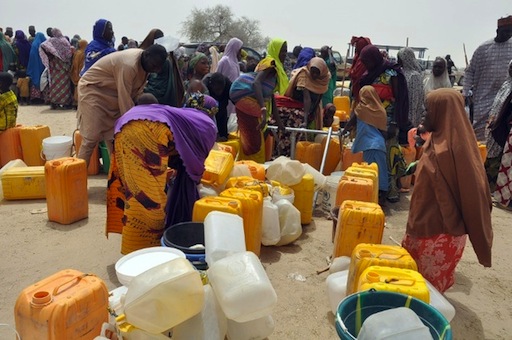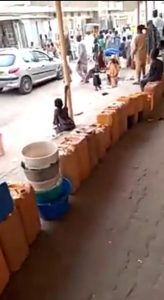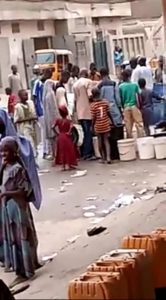The Untold Story Of Alfindiki Community In Kano

Residents in Kano metropolis hit by severe water scarcity, are drawn into daily desperation to assuage their domestic and sanitary needs. Troubled by this, women, children and young men are out for long hours each day in search of potable water.
Long queues of residents in commercial boreholes to fetch water is alarming, as the citizens narrated that most of the time they made voluntary contributions to purchase a tank of water from water vendors who are not often sufficient for the entire community.
Alfindiki, a community in Kano Municipal, is faced with water shortage for over five years. Kano State Water Board in an interview with HumAngle revealed that the residents vandalized water infrastructure by obstructing waterways.
Not only Alfindiki, some residents from other neighbouring communities’ crossover to fetch out of the water Alfindiki’s community members or some philanthropists provide, such as Dandago, Sheshe, kudidufawa, and others.
The northern Nigerian town of Kano has been experiencing water shortages for many years. The two major water treatment plants there supply less than the need of 400 million litres per day.
Over a year ago, Kano town authorities thought they found an answer to their water shortage: the opening of a new, ultra-modern water treatment plant at the cost of US $58 million at the town of Tamburawa. It will produce 150 million litres of water to supplement the old pump in Challawa, which provides 180 million litres per day.
Currently, Kano state is producing 500 million litres of water which is not enough for the entire state to project that 700 million litres would have been enough for distribution. (source, Kano state water board; engineering department) Though the plants are fully functional, residents in Kano are still grappling with the problem of water scarcity.
The residents of Alfindiki said they had suffered neglect from the government over neglecting their aid of provision of water in their local environment.
Not only Alfindiki other places in the metropolis and remote areas also suffered a lack of water supply. They explained that most of their daily activities need water such as cooking, bathing, washing, and others have become puzzling and indubitable.
Despite the allocated budget of 15 billion Naira to Kano state ministry of water resources in the 2019 fiscal year budget, still adequate water supply is still at an alarming point to several places in Kano state.
In 2016 an assessment which was carried out by Tasiu Yalwa Rilwanu stated that “open well is the common source of water in the rural villages of Kano with 41.4% of the total responses. In terms of usage of the water, the reservoir recorded the highest responses of 30.7%. As also determined that 60.7% of the respondent stated that they buy water from water vendors.
62.9% of the respondents believe that drinking water is inadequate in the rural villages of Kano state. Research findings attributed that 39.3% of the respondents said the water sources are controlled by individuals and most of the water users obtain their water in less than 500m trek distance according to 67.8% of the respondents.”
HumAngle interviewed some residents in an investigation over the issue of water scarcity, they said complains been issued to the water board on several occasions but tends to be turned down.
Hussaini Ibrahim, a resident of Alfindiki, said, “we are suffering and facing water scarcity. We only use to have water once in a blue moon because since when fasting has started, we have been purchasing water for our daily usage. Sometimes we do get aid from community members and philanthropists such as Dangote group which provides us with two tanks of water daily, which is not enough for us.
All our taps are tasty as no drop of water coming from it because the water doesn’t last for more than 1 hour and it only comes once in a blue moon. I am so happy with this interview, and I pray the right source should weep our tears.
Ibrahim Yaro, an elder in the community, said “For over seven years we have no access to tap water, we trek an extra mile to fetch or buy water from nearby neighbourhoods. Not until after five months now we the community members financed to get 2water tanks, that we often refill with water from contributions made by community members or individuals.
The Kano state water board, which is responsible for distributions of water and checkmating issues, from reports gathered has shown that the water board is aware of the situation. However, due to the absence of the existing pipes has a slow pace, the repair of water in the community.
Reacting to the situation the Kano State Water Board Engineer Garba Ahmad Bichi told HumAngle that the government is putting all efforts to fix the issue so that residents of Alfindiki and its surroundings can access potable water easily.
However, the water board has captured it in the budget, waiting for government approval so as the project for the restoration of the pipelines can kick start.
Support Our Journalism
There are millions of ordinary people affected by conflict in Africa whose stories are missing in the mainstream media. HumAngle is determined to tell those challenging and under-reported stories, hoping that the people impacted by these conflicts will find the safety and security they deserve.
To ensure that we continue to provide public service coverage, we have a small favour to ask you. We want you to be part of our journalistic endeavour by contributing a token to us.
Your donation will further promote a robust, free, and independent media.
Donate HereStay Closer To The Stories That Matter






